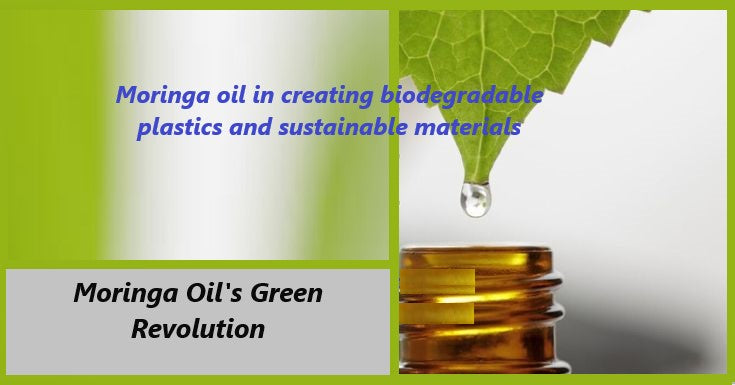In the global fight against plastic pollution, innovative solutions are crucial for paving the way towards sustainability. Among these, Moringa oil emerges as a surprising yet potent ally. Derived from the seeds of the Moringa Oleifera tree, known for its myriad health benefits, Moringa oil is now being explored for its potential to create biodegradable plastics and other sustainable materials. This article delves into the role of Moringa oil in environmental conservation, highlighting its applications, benefits, and the impact it promises in reducing plastic pollution.
The Plight of Plastic Pollution
Plastic pollution represents one of the most pressing environmental issues of our time, affecting land, waterways, and oceans globally. Its scale and severity have escalated to alarming levels, with far-reaching impacts on ecosystems, marine life, and human health.
Global Impact
- Scale of Pollution: Over 300 million tons of plastic are produced every year, with a significant portion ending up in the natural environment. Less than 10% of all plastic waste ever produced has been recycled, leading to widespread pollution.
- Effects on Marine Life: Approximately 8 million tons of plastic enter the oceans annually, harming over 600 marine species. Marine animals ingest plastic debris, mistaking it for food, which can lead to internal injuries, starvation, and death. Entanglement in plastic waste also poses a significant threat, leading to drowning, suffocation, or severe injuries.
- Impact on Ecosystems: Plastic pollution disrupts ecosystems, affecting the food chain and biodiversity. Microplastics, tiny plastic particles, have been found in the most remote areas, from the Arctic ice to the depths of the oceans, indicating the pervasive nature of the problem.
- Human Health Risks: Microplastics have been detected in drinking water, sea salt, and even in the human body. The health implications of microplastic ingestion and exposure are not fully understood, but there is growing concern about potential links to cancer, reproductive issues, and other health problems.
Need for Alternatives
The crisis of plastic pollution underscores the urgent need for sustainable alternatives to conventional plastics. These alternatives must not only match the versatility and durability of traditional plastics but also ensure environmental safety by being capable of degrading without harming the environment.
- Biodegradable and Compostable Plastics: Materials that can break down naturally in the environment or in composting facilities, leaving no harmful residues.
- Bio-based Plastics: Plastics made from renewable biological resources, such as plant oils, starches, or cellulose, which can reduce dependency on fossil fuels and decrease carbon footprint.
- Circular Economy Approaches: Systems where plastic products are designed for reuse, recycling, and recovery, minimizing waste and environmental impact.
- Innovation and Research: Ongoing research into new materials, such as those derived from algae, fungi, or other natural substances, offers hope for truly sustainable alternatives.
Moringa Oil: A Sustainable Alternative
Sustainable Sourcing of Moringa Oil
Innovations in Biodegradable Plastics
Research & Development on Moringa Oil-Based Polymers
Applications and Impact
Biodegradable Packaging Solutions from Moringa Oil-Based Plastics
The use of Moringa oil-based plastics in creating biodegradable packaging solutions represents a significant step forward in reducing reliance on traditional, petroleum-based plastics. These innovative packaging solutions are designed to decompose naturally, thereby minimizing environmental pollution and facilitating a move towards more sustainable consumption patterns. Here's how Moringa oil-based plastics are being utilized in packaging:
- Food Packaging: Moringa oil-based bioplastics are being developed for use in food packaging, such as containers, wrappers, and bottles. These materials offer the necessary durability and safety for food storage, while also being biodegradable, reducing waste in landfills and oceans.
- Shopping Bags: Biodegradable shopping bags made from Moringa oil-based materials are another area of application. Unlike conventional plastic bags, these biodegradable bags can break down naturally after use, significantly reducing plastic pollution.
- Protective Packaging: For items that require protective packaging, such as electronics or fragile goods, Moringa oil-based foams and wraps offer a sustainable alternative, providing the needed cushioning and protection without the environmental footprint of synthetic materials.
Agricultural and Medical Uses of Moringa Oil-Based Materials
Beyond packaging, Moringa oil-based materials find applications in agriculture and the medical sector, showcasing their versatility and biocompatibility.
- Biodegradable Mulch Films: In agriculture, Moringa oil-based bioplastics are used to produce biodegradable mulch films. These films cover soil to regulate temperature, retain moisture, and suppress weeds, and they naturally decompose at the end of the growing season, eliminating the need for removal and disposal.
- Seedling Trays: Seedling trays made from Moringa oil-based plastics provide an eco-friendly alternative to traditional trays. They can be planted directly into the soil, where they biodegrade, reducing transplant shock and plastic waste.
- Biocompatible Implants: The biocompatibility of Moringa oil-based materials makes them suitable for medical applications, such as implants or sutures that can safely biodegrade within the body, reducing the need for additional surgeries to remove them.
- Drug Delivery Systems: Moringa oil-based polymers are being explored as materials for drug delivery systems. Their biodegradability and compatibility with human tissue make them ideal for developing controlled-release drug delivery mechanisms, potentially improving patient outcomes.
The development and application of Moringa oil-based materials in these sectors not only contribute to reducing the environmental impact of plastics but also offer innovative solutions to longstanding challenges in packaging, agriculture, and healthcare. As research and technology continue to advance, the potential for Moringa oil-based bioplastics and materials is vast, promising a more sustainable future across various industries.
Challenges and Future Directions
Scalability and Cost of Moringa Oil-Based Bioplastics
The transition from conventional plastics to Moringa oil-based bioplastics involves several challenges related to scalability and cost, which are crucial factors for widespread adoption.
Scalability Challenges
- Raw Material Supply: The scalability of Moringa oil-based bioplastics is contingent upon a consistent and large-scale supply of Moringa oil. While the Moringa oleifera tree is hardy and fast-growing, expanding its cultivation to meet industrial demand requires significant investment in agriculture, including land, labor, and resources.
- Production Infrastructure: Developing the infrastructure for processing Moringa seeds into oil and subsequently into bioplastics requires substantial initial investment. Existing plastic production facilities are geared towards petrochemical-based processes, and transitioning to bio-based materials may necessitate modifications or entirely new facilities.
- Supply Chain Development: Establishing a robust supply chain for Moringa oil-based bioplastics, from raw material sourcing through to product manufacturing and distribution, is essential. This involves coordination across different sectors and geographical regions, which can be complex and costly.
Cost Implications
- Higher Production Costs: Initially, Moringa oil-based bioplastics may be more expensive to produce than conventional plastics due to the costs associated with sustainable cultivation of Moringa, extraction of the oil, and the development of bioplastic materials. These costs may decrease over time with technological advancements and economies of scale.
- Market Price: The higher production costs of Moringa oil-based bioplastics could lead to higher prices for end products. However, consumer willingness to pay a premium for sustainable, eco-friendly products could mitigate this issue.
Performance and Durability of Moringa Oil-Based Materials
Enhancing the performance and durability of Moringa oil-based materials to meet diverse application needs is a focus of ongoing research.
Performance Enhancement
- Material Properties: Research aims to improve the mechanical properties of Moringa oil-based bioplastics, such as strength, flexibility, and resistance to water and heat, to make them viable alternatives for a wide range of applications.
- Additives and Blends: Incorporating natural or synthetic additives and blending with other biopolymers are strategies being explored to enhance the performance of Moringa oil-based materials. These approaches can improve durability, biodegradability rates, and other functional properties.
Durability Concerns
- Environmental Stability: Ensuring that Moringa oil-based materials maintain their integrity and functionality during their intended lifespan, while still being able to biodegrade efficiently after use, is a key research area. This involves balancing the rate of biodegradation with the need for durability in various applications.
- Long-Term Performance: Studies are also focused on understanding and optimizing the long-term performance of Moringa oil-based bioplastics, including their behavior under different environmental conditions and over time.
The challenges related to scalability, cost, performance, and durability are significant, but they are not insurmountable. With continued research, development, and investment, Moringa oil-based bioplastics have the potential to become a viable and sustainable alternative to conventional plastics, contributing to the reduction of plastic pollution and the promotion of a more sustainable future.
Final Thoughts
The journey towards reducing plastic pollution requires collective effort, innovation, and the willingness to embrace alternative solutions. Moringa oil, with its potential in creating sustainable materials, exemplifies the kind of innovative thinking needed to address environmental issues. As we move forward, the role of Moringa oil in fostering sustainability serves as a reminder of nature's ability to provide solutions to human-made problems, encouraging a deeper commitment to preserving our planet for future generations.

